Colorado’s transgender youth are tired of being political pawns

DENVER — Auggie Caudill attended their first protest at 11 years old.
Iliana Trujillo switched schools because of severe bullying as a Latina, transgender girl.
In sixth grade, Soup Hannon said a classmate told her she was going to hell after Hannon came out as a transgender girl.
Aaron Michaels said he fled the public school system because he was harassed and assaulted for being Black and gay.
Dallas Hurley witnessed armed protesters at his first LGBTQ+ event.
RJ Fee said he left his home in Southwest Florida because being transgender in the state became too dangerous.
As anti-queer legislation becomes law across the U.S., Colorado’s policies have remained relatively welcoming, yet kids in the state continue to be impacted by dangerous rhetoric.
Amid this turmoil, seven LGBTQ+ children from around Colorado shared their stories with Rocky Mountain PBS.
Anti-queer legislation has dominated news cycles and state legislatures over the last three years. And former President Donald Trump has promised to target transgender individuals if he is elected to a second term.
Rhetoric calling LGBTQ+ adults “groomers,” has surged more than 400% on social media since 2022 when Florida passed its “Don’t say Gay or Trans” law. The combination of political and cultural dangers the queer community faces nationwide led the Human Rights Campaign to declare a state of emergency.
Anti-LGBTQ+ legislation was a common theme in Republican-led state legislatures in 2022, 2023 and 2024. In 2023, lawmakers in 37 states brought 142 bills targeting the queer community.
Many of the bills targeted transgender youth and their affirming parents and teachers. The Human Rights Campaign reported 35% of transgender youth live in states that have passed bans on gender-affirming care for minors.
Colorado, which is considered a sanctuary state for LGBTQ+ people, only saw one statewide anti-trans proposal in 2023. It was defeated in committee.
Individual school districts across the state, however, have passed a series of bills targeting which bathrooms transgender students can use, what names and pronouns teachers can use for them and what flags and pins they can display at school.
Transgender youth in Colorado told Rocky Mountain PBS that national hatred has trickled into their communities, prompting bullying, harassment and discrimination from their peers and adults.
“I get a lot of ridicule from people around me,” said Soup Hannon, an 18-year-old transgender woman in Steamboat Springs. “I think it’s because of the bizarre obsession that the Republican Party has developed with trans people.”
In Steamboat — a city known for its outdoor enthusiasm — Hannon said anti-transgender rhetoric has reached sports teams in town. As a transgender student, Hannon said she and others are often told that trans women should be excluded from women’s skiing leagues.
Colorado does not have laws preventing transgender children from playing on sports teams that align with their gender identity.
“I didn't sign up for this,” Hannon said. “I didn’t sign up to have to be the person who’s always correcting misinformation when it's brought up or being the person who all my cisgender friends and family turn to with questions about whatever.”
Despite the perils it’s brought, Hannon said being transgender has given her an outlet to express herself. It's also brought bravery and resilience.
“I think it’s a uniquely beautiful experience,” Hannon said. “It’s sort of like sculpting.”
Arianna Anderson, a queer teenager in Craig, said in rural communities like hers, LGBTQ+ people face backlash and fear.
“In rural communities like this, there’s still so much hate,” Anderson said. “People are at risk, and I wish the times would change.”
Auggie Caudill remembers marching around Denver at 11 years old decked out in rainbow gear, waving signs of support and trying to spread anti-hate messages.
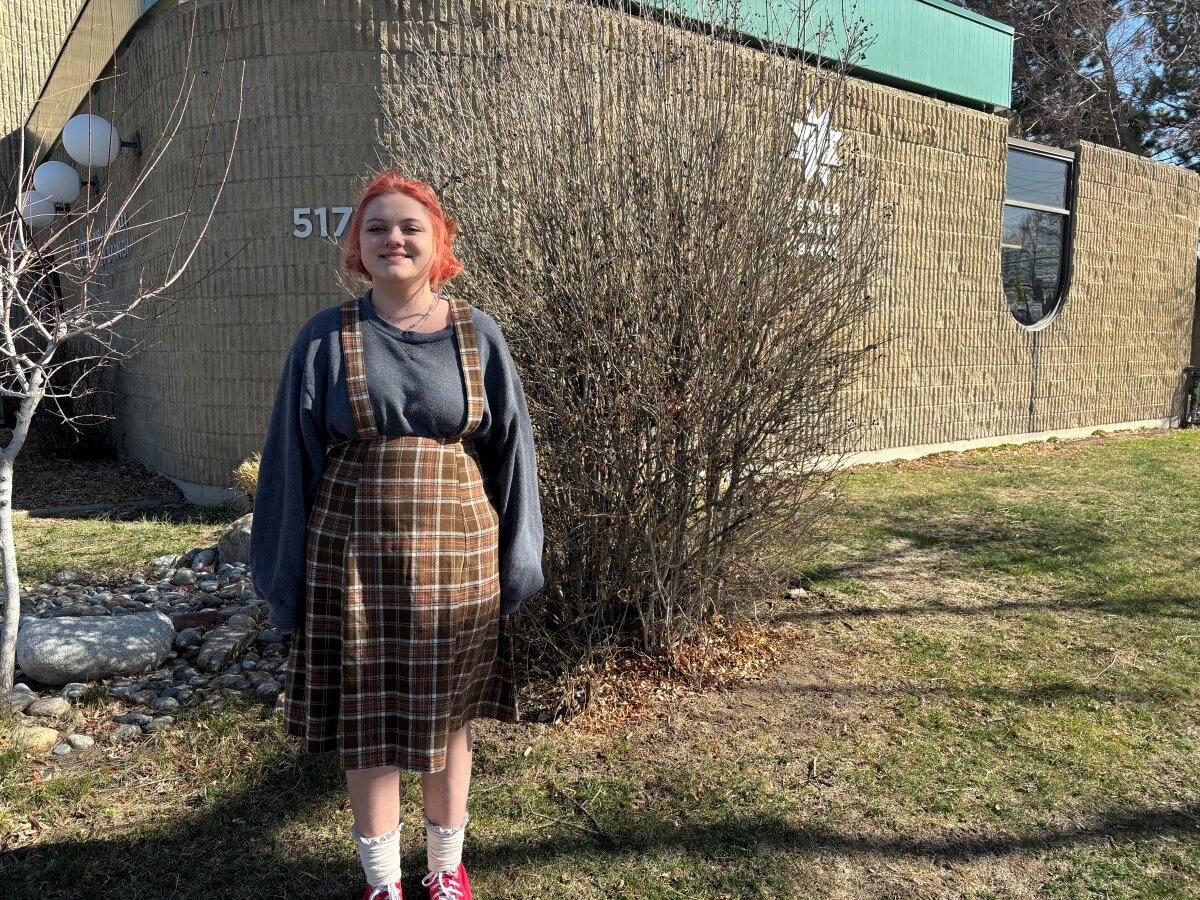
Auggie Caudill, 16, outside the Denver Public Library Bear Valley branch.
Photo: Alison Berg, Rocky Mountain PBS
Caudill, who is 16 years old and non-binary, wishes the march had been a celebration.
Instead, it was to protest homophobia and transphobia following the murder of 49 people at Pulse, a gay nightclub in Orlando.
“I just remember crying a lot because I didn’t understand how somebody could do that,” Caudill said. “Literally and morally.”
“How could you have that much hate in your heart?” Caudill wondered.
Caudill surrounds themselves with a supportive partner and friends, they said that’s the only way they’ve survived in high school.
Over the last five years, Caudill has assumed the roles of activist and protester.
“I don’t want anyone else to feel the ways I’ve felt, and I don’t think there’s a reason for me to be quiet about what I believe,” Caudill said.
Caudill testified to the state legislature in favor of a gun safety bill in 2023.
“Anytime they’re out there and want to be outspoken about anything, it doesn’t matter what they say, it’s immediately ‘look at this mentally abused child,’” said Auggie’s mother, Tiffany Caudill.
During their first year of high school, Auggie said other students would take photos of them and later post them to social media with slurs and bullying comments. Their family has also been doxed.
“It’s terrifying,” Tiffany said. “It’s terrifying watching your child be so brave and strong in knowing who they are and then watching the world try to crush that.”
Letting kids be kid
RJ Fee and his family fled Southwest Florida two years ago, in part, to find safety in a state with laws protecting transgender people.
Fee, a 15-year-old transgender boy, asked people to call him by a masculine name — different from his legal name — in first grade. Kids at such a young age weren’t yet aware of discrimination, Fee said, and happily obliged.
But as the years went by, the insults came.
“I remember people telling me it was gross and that I was weird,” Fee said.
Fee, who is now homeschooled and lives in Colorado, said he and other transgender children have been pushed into political advocacy.
While Fee said he is happy to use his voice to fight for himself and kids like him, the work is exhausting for a child.
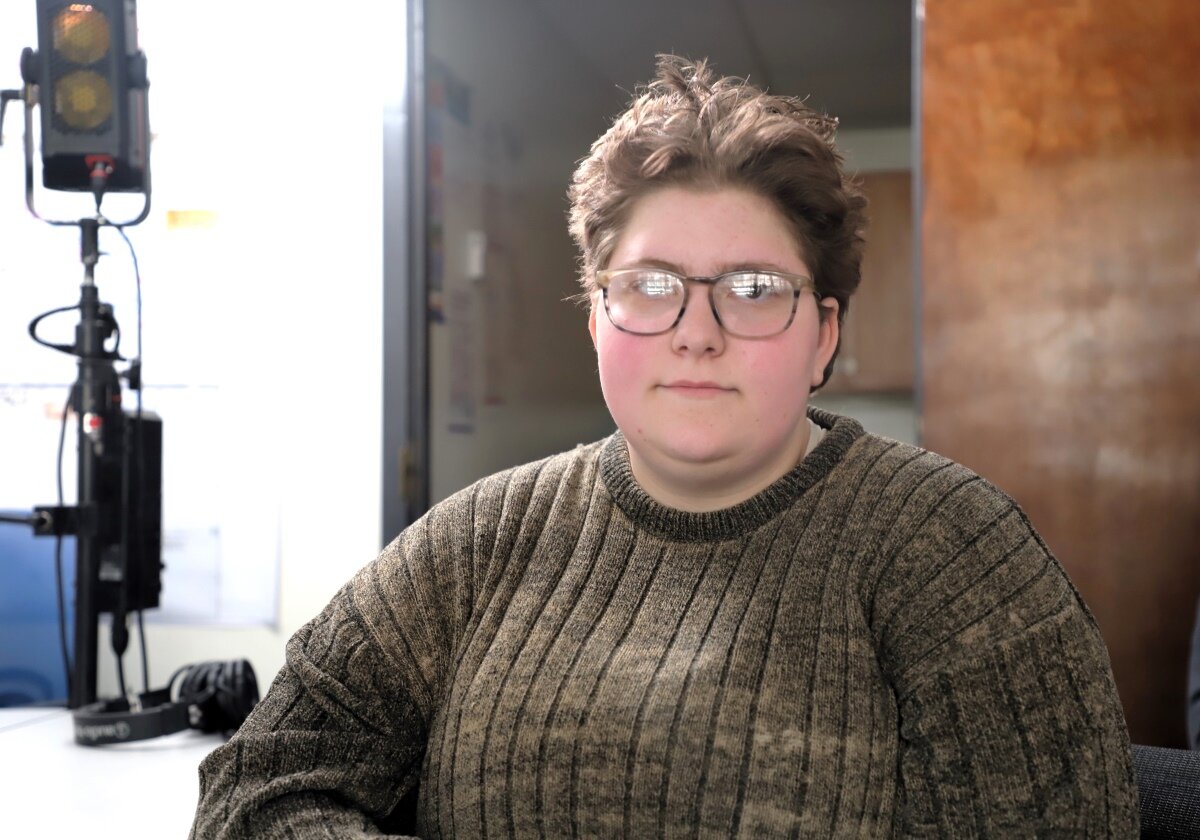
RJ Fee, 15, speaks about his experiences as a transgender boy who moved from Florida to Colorado.
Photo: Alison Berg, Rocky Mountain PBS
“I feel like I’ve been thrust into this situation of political advocacy because I’m seen as a political adversary,” Fee said. “The idea of trans people just existing in this day in age is a political argument to some.”
Many lawmakers supporting anti-trans legislation have named laws “let kids be kids” or pointed to the sentiment as a reason to ban gender-affirming care for children.
But Fee is clear: he is grateful to be transgender and wishes everyone would allow themselves the same expression and creativity that transgender kids have when making decisions about their names and presentations.
“I feel like being trans is part of being a kid,” Fee said. “It’s about exploring yourself and fulfilling who you are.”
John Fee, RJ’s father, said watching his transgender son spend his days contacting representatives instead of doing “normal” teenaged activities is both heartbreaking and infuriating.
“I have huge issues with how we’re forcing kids to become political activists just for being who they are,” John said. “I’m proud of him for doing what he does but I just wish we didn’t live in a world where children were forced into political ideologies.”
John has a wispy white beard, wears baseball caps and speaks with a slight southern accent. As a white man from Florida who looks the way he does, John said others often share their hateful views with him, stereotyping him as someone who would share the same ideologies. But the least he can do, John said, is try to correct harmful beliefs as they come up.
If nothing else, John speaks out so RJ doesn’t have to.
“Most cisgender, straight kids probably couldn’t tell you who their senator is,” John said. “Trans and queer kids are having to call their senators every day begging for their respect.”
Added barriers
When Aaron Michaels and his mother arrive at their local grocery store in Highlands Ranch, Michaels usually stays in the car to avoid stares and glares.
“Highlands Ranch is definitely not a safe place for people like me,” Michaels said. “There’s a lot of people who aren’t good people there.”
Michaels is a cisgender, gay, Black, 15-year-old boy. He’s a drag performer who performs under the name “Hunnie Bun.”
Hosting a podcast — called “Let’s Get Serious” — Friday afternoons where he interviews other LGBTQ+ youth, Michaels’ dusts his eyelids with sparkly shadow and wears bright lipstick. His styles his hair in a curly blonde bob, and finishes the look with heavy, black-rimmed glasses.
Dressing this way is liberating for Michaels. It’s a reminder that his body is a canvas for art and presentation.
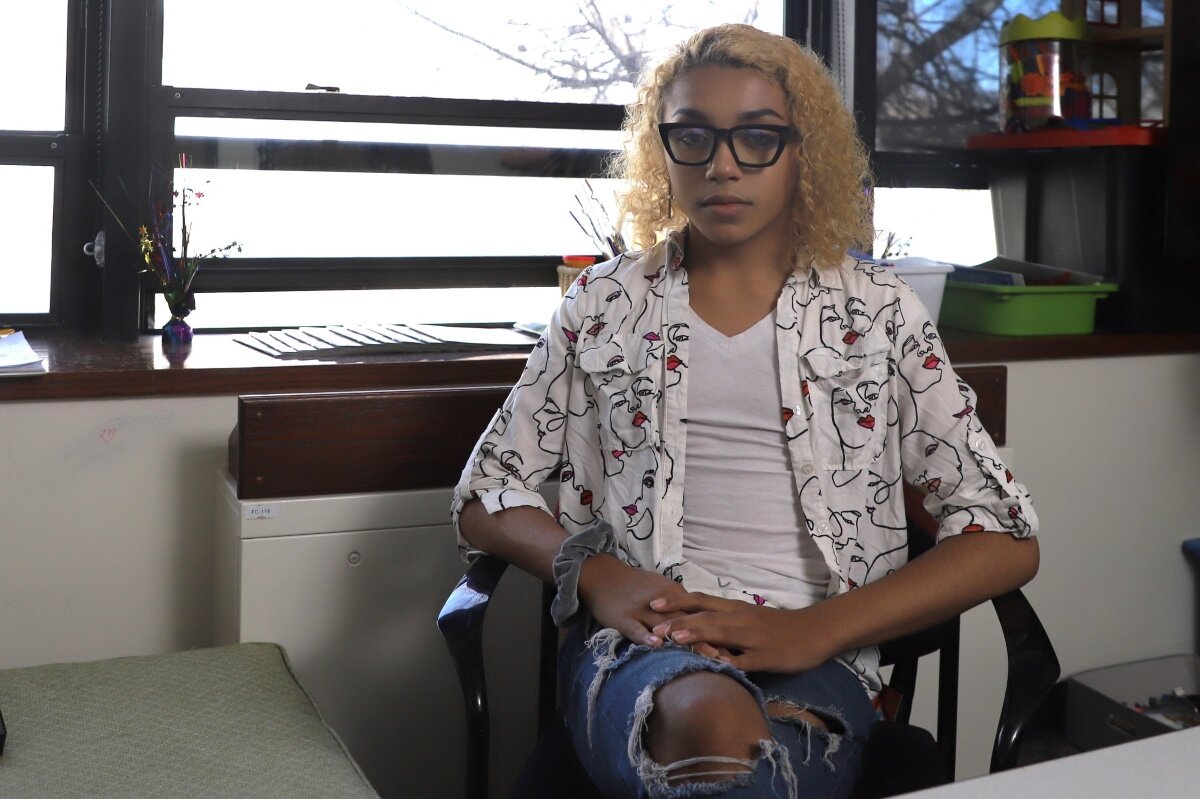
Aaron Michaels, a 15-year-old drag entertainer, speaks about his experiences being Black, gay and performing in drag while living in Highlands Ranch.
Photo: Alison Berg, Rocky Mountain PBS
Michaels found a haven in YouthSeen, a local nonprofit that serves LGBTQ+ youth of color. (Note: YouthSeen’s founder, Tara Jae, is a former employee of Rocky Mountain Public Media.)
Performing at drag brunches in Fort Collins also brings him joy.
While recording his podcast in a studio decked out in Pride flags, and surrounded by affirming adults, Michaels knows no one will hurt him.
But once he leaves the building, Michaels knows his race and expression can attract hate.
“Being queer is full of joy,” Michaels said. “But it can also be torturous sometimes because of the world we live in.”
Iliana Trujillo understands the viciousness of other kids her age. A 14-year-old transgender Latina, Trujillo left her school between middle school and high school because the bullying was so severe.
“After I finished 8th grade, I just couldn’t take what I was going through,” Trujillo said.
Much of the backlash she faced after coming out as transgender, Trujillo said, came from adults twice her age and older. Trujillo found it disturbing.
“I understand that sometimes adults don’t get to live the way they want to because of how they were raised,” Trujillo said. “But when it’s adults doing the bullying, it’s weird.”
Trujillo prides herself on being “loud and expressive,” and said she has learned to use negative comments to fuel her authenticity. She loves her loudness and is unapologetically herself.
“I don’t ever plan on changing,” Trujillo said. “I plan on being me forever.”
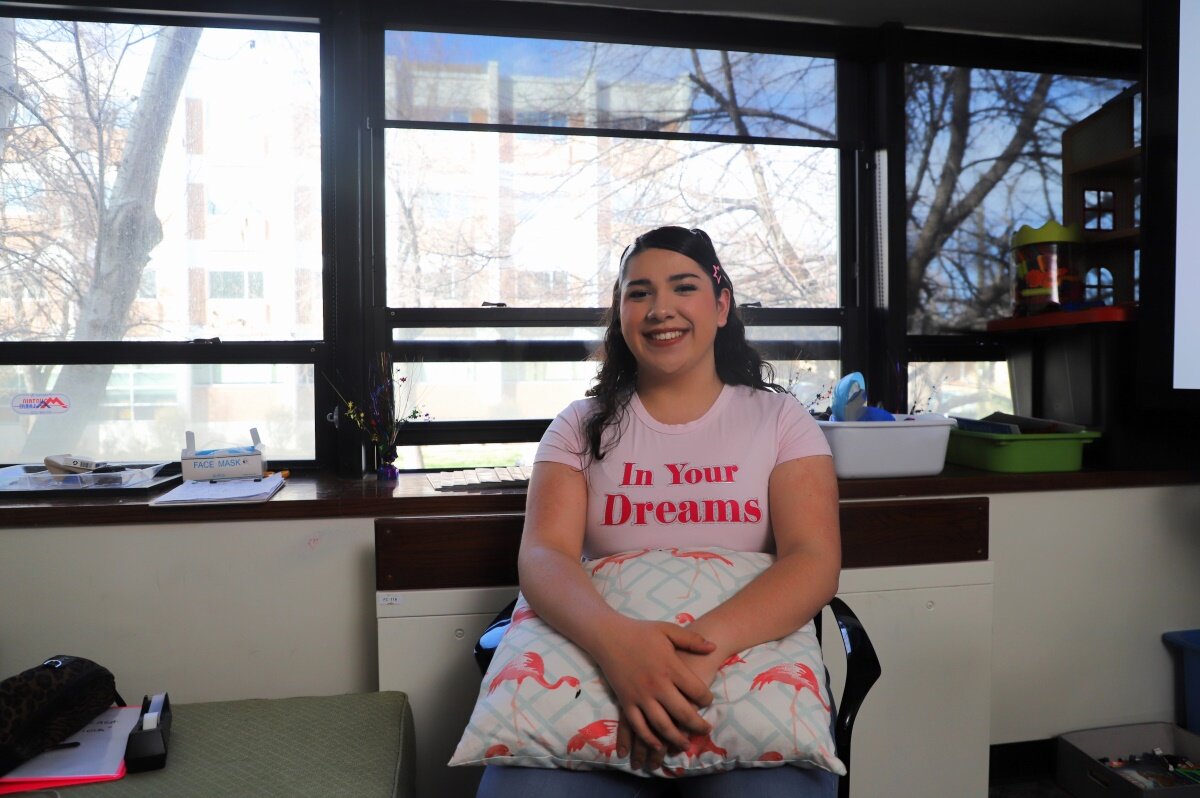
Iliana Trujillo, 14, discusses being Latina and transgender. Trujillo lives in Commerce City.
Photo: Alison Berg, Rocky Mountain PBS
Dallas Hurley tries to avoid the news. As a transgender boy, Hurley is afraid of what horrors he might see flipping through television stations or clicking around a news website.
“Whose murder am I gonna see today?” Hurley asks himself.
The Hurley family fled Texas in 2022, years after Hurley came out as bisexual, then transgender.
At an LGBTQ+ picnic Hurley attended just after coming out, armed protestors with automatic weapons invaded the area, using megaphones to yell offenses at the attending children.
Some of the protestors were, themselves, kids, there with parents or older siblings.
“Hate is learned,” Hurley remembered thinking. “You’re not born with that much hate.”
Since moving to Colorado, Hurley and his queer brother have faced verbal attacks from their neighbors. Hurley and his family have called the police but said authorities have yet to address the situation.
The Hurley family is moving.
Stories of transgender kids being attacked or killed just for living authentically hit too close to home for Hurley.
“They’re being killed for who they are without second thought,” Hurley said. “People are out here doing it just because, and that’s scary.”
Attending protests, calling representatives and educating family members are also commonalities shared by trans youth, Hurley said.
“It feels like being politicized is part of the experience, unfortunately, and you can't really say that you’re trans without experiencing some form of discriminatory behavior towards you,” Hurley said.
“From news articles that discuss the murders of transgender people to dangerous threats, to our personal safety, we all have experienced it at some point.”
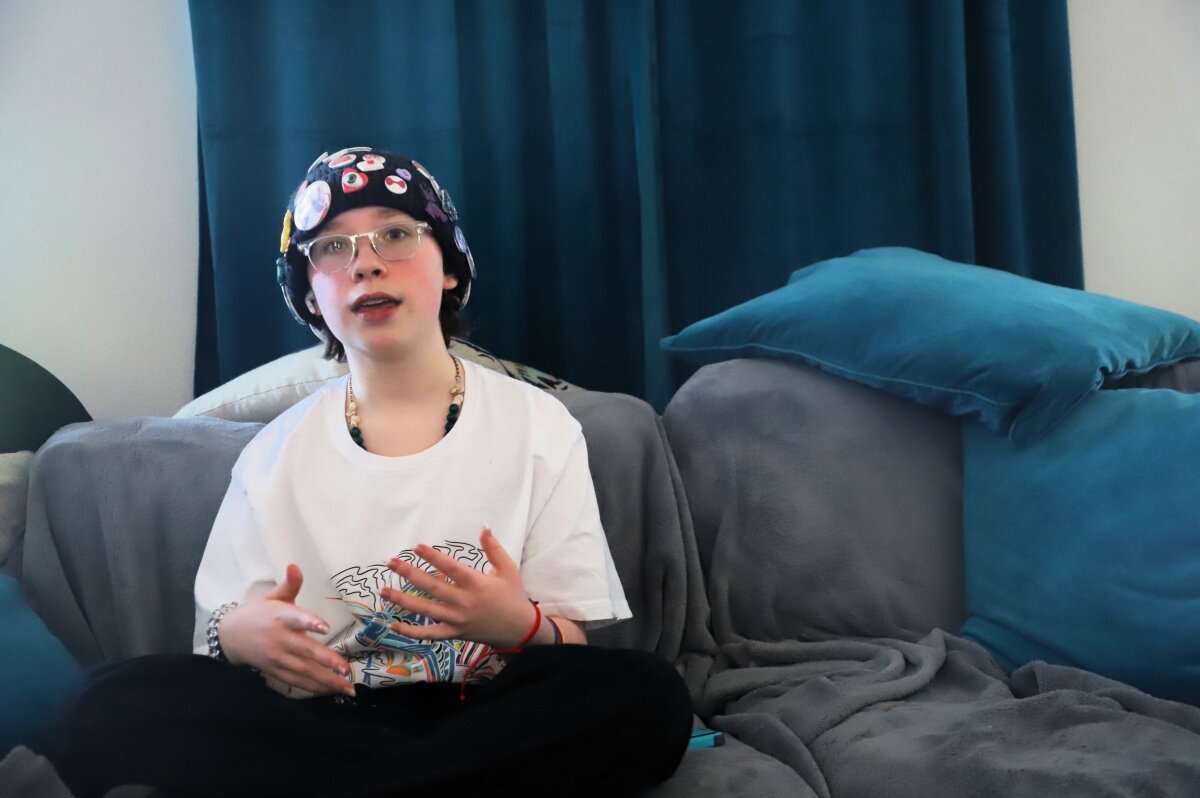
Adversity and affirming adults
After her son — Aaron Michaels — came out as gay, Gabrielle Williams scratched her head figuring out how to let him express himself while protecting him from those who wanted to hurt him.
“How do I keep him safe without keeping him in a cage?” Williams asked herself. “It’s a very real and valid fear.”
After watching Michaels embrace himself and find unwavering love in community, Williams quit her job as a real estate agent to work as the program director for YouthSeen.
“A lot of youth have a really clear idea of who they are or who they want to be,” Williams said. “I think sometimes adults don’t do a good job of listening and advocating for them to be who they are.”
A study from The Trevor Project found the majority of young LGBTQ+ people participate in some form of civic activism despite not being old enough to vote.
The same study found youth who paid close attention to current events or participated in protests had higher rates of suicide than their peers.
“It’s terrible and it makes sense because if you’re spending your life trying to express to people that you deserve to exist, that's exhausting and that's heartbreaking,” said Liss Smith, communications and advocacy director for Inside Out Youth Services, an LGBTQ+ youth-serving nonprofit in Colorado Springs.
“The smiling and the laughing and the playing are things that are sorely missing in the lives of kids who shouldn’t have to be advocating so hard for themselves,” they said.
In Colorado Springs, specifically, Smith said kids are struck with trauma after the Club Q shooting. Smith said many knew people impacted by the shooting and it remains top-of-mind for queer youth. Several school districts in the Pikes Peak region have also explored or implemented policies that are harmful to LGBTQ+ students.
“People simply don’t know the truth of trans youth and they’ve heard all of these myths and lies, frankly, and that's sadly making its way into policy,” Smith said.
Still, advocates emphasized that allowing kids to express themselves is ultimately the best way to support them. Williams said trying to protect a child by denying them authentic expression can make them “die inside.”
“Trying to protect your kid from the world can sometimes make them die slowly by shutting them out of things out of fear,” Williams said. “You figure it out when you choose life.”
Alison Berg is a reporter at Rocky Mountain PBS. Alisonberg@rmpbs.org.